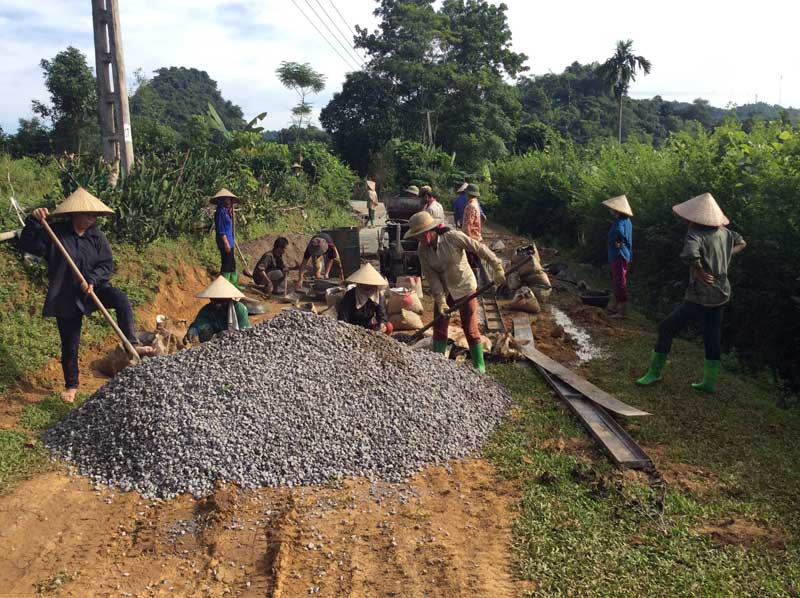
(HBO) – Preserving traditional cultural values has formed the basic foundation for Dich Giao commune, a locality inhabited by Muong ethnic people and located in the centre of Muong Bi region, to successfully develop a standout new style rural area model in Tan Lac district.
Dich Giao commune was recognised as a new style rural area in June 2015. Local
Party, authorities and people have continued their efforts to mobilise social
resources to improve its realised criteria. The commune has upgraded and
expanded many rural roads in accordance with set criteria. Roads running
through Khang, Sung 2 and Sung 3 hamlets were enlarged to 3.5 metres in width.

Photo:
Locals in Khang hamlet, Dich Giao commune involve in road construction
The commune has paid due attention to ensuring rural environment. Along
with signing commitments with the authorities to protect the environment in
production and breeding, local people have maintained road clean-ups to ensure
public health. Responsibilities of local individuals are concretised in each
hamlet’s regulations. Accordingly, local residents voluntarily clean up rural
roads in every Saturday.
Bui Van Dinh, Chairman of the Dich Giao commune People’s Committee, said: "The
commune’s success in implementing the national programme on building new style
rural areas is spurred by the consensus of local officials and Party members
who have set good examples and played pioneering roles in the mission”.
Notably, Dich Giao has prioritised the preservation of traditional cultural
values. Despite the changing life, it is still common to see traditional
costumes to be worn by local people or hear stories and greetings in ethnic
languages. It becomes the ideology of local people in the new style area
building process.
During the construction of rural infrastructure, more than 700 households
donated their lands. Among families giving hundreds of metres of land are Bui
Van Hau’s family in La hamlet and Bui Thi Thoan’s family in Sung 1 hamlet.
Currently, 11 out of 14 hamlets in the commune are cultural villages and more
than 85 percent of households are recognised as cultural families./.
At HANOI JVC Training Center (Hanoi), the Farmers’s Support Center, the Provincial Farmers' Union and VTC1 International Development joint Stock Company recently held a signing ceremony for a cooperation agreement to link consulting and create the labor resources working abroad for a limited period of time.
In recent years, the education career in Yen Thuy district has changed positively. The school facilities have newly been built and the quality of education has improved.
The Board for Women's Advancement of Hoa Binh province on November 11 officially launched the Action Month for Gender Equality, focusing on preventing and addressing gender-based violence. As part of the event, a special talk was held on the theme of sharing household work for a happy family. The event drew 300 delegates, including Nguyen Van Toan, Standing Vice Chairman of the provincial People's Committee and head of the provincial Board for Women's Advancement.
The people in Hoa Binh province are aware of the need to build and preserve the cultural traditions and unique customs of their communities, especially those related to ethnic identities and family values which serve as foundation for a vibrant, tradition-rich Hoa Binh, enriching community life. In recent years, the province’s Party Committee, authorities, and residents have paid heed to building and developing family values and fostering human standards in the new era.
The festival of great national solidarity and culture in 2024 was held at the communal house of Da Bac district on November 5. Vice Chairman of the provincial People’s Committee Nguyen Van Toan and leaders of departments and sectors attended the event.
The Labor Federation of Da Bac district has focused on protecting workers' rights while actively participating in patriotic emulation movements to enhance the creativity and productivity of the local workforces across agencies, organisations and enterprises.



